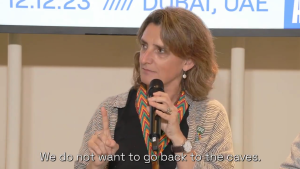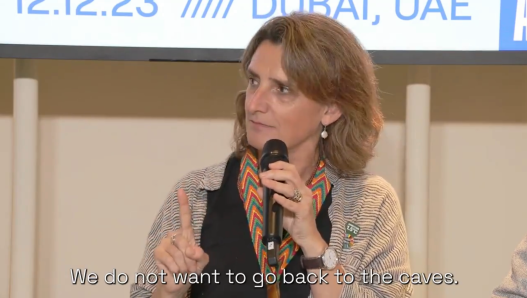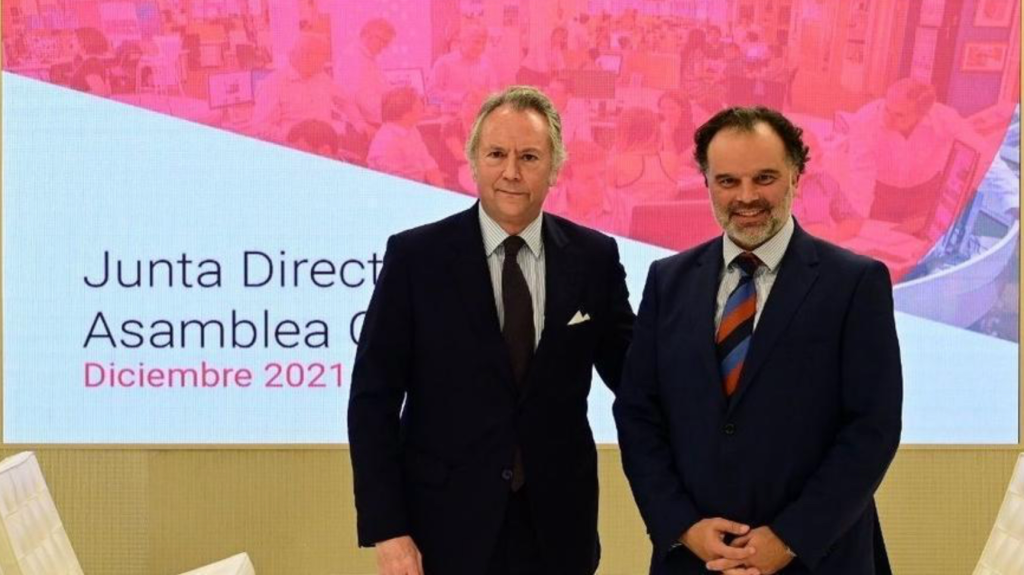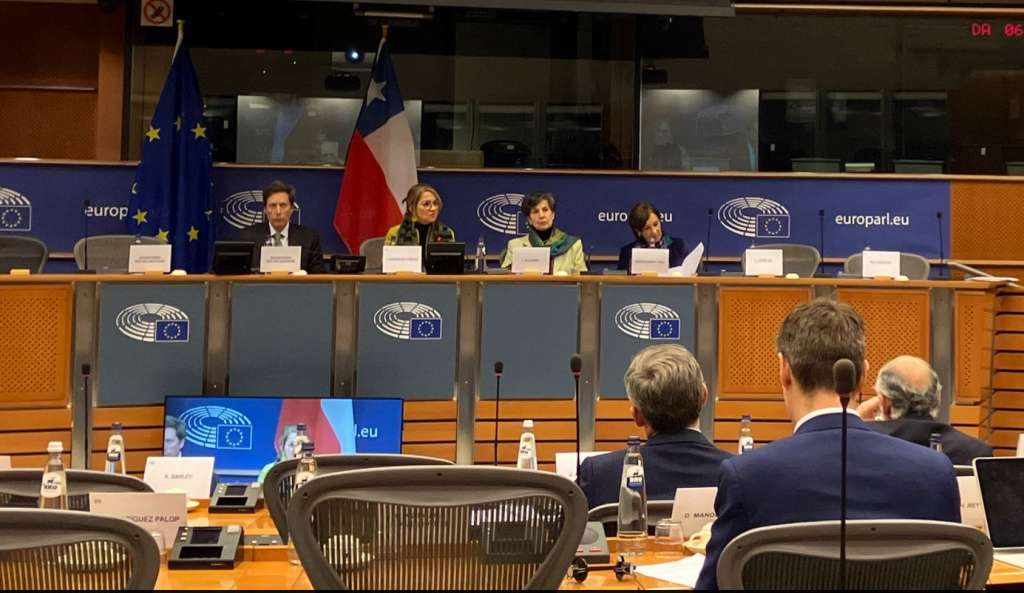
RIBERA RESPONDS TO THE PRESIDENT OF COP28: 'WE DO NOT WANT TO RETURN TO THE CAVES, WE WANT EFFICIENT ENERGY'
Teresa Ribera, Spain’s third vice-president and minister for Ecological Transition and the Demographic Challenge, responded to the controversial words of the president of COP28, Sultan Al Jaber. He had stated that “there is no scientific evidence” that the elimination of fossil fuels will reduce the temperature to 1.5 degrees Celsius and defended this type of fuel “unless we want to return the world to the caves”.
“We don’t want to go back to the caves, what we want is an efficient energy system based on renewable energies,” said the Vice President during one of the COP debates.
“There is no science, no scenario, that indicates that phasing out fossil fuels is what is going to achieve (the reduction of) 1.5 degrees Celsius,” Sultan Al Jaber declared last Nov. 21 during an online debate with Mary Robinson, president of the Elders group and former UN special envoy for climate change. “Please show me the roadmap for a phase-out of fossil fuels to allow for sustainable socio-economic development, unless you want to take the world back to the caves,” he continued.
Al Jaber’s words were reported by the Centre for Climate Reporting and reproduced on Sunday, December 3 by the British newspaper The Guardian, coinciding with the twenty-eighth Conference of the Parties to the United Nations Framework Convention on Climate Change (COP28) in Dubai.
In addition to chairing COP28 in Dubai, Al Jaber is CEO of the UAE’s state-owned oil company, Adnoc. During the same debate, Robinson stated that this company “is going to invest much more in fossil fuels in the future” and the Sultan accused her of getting her information from “biased and erroneous media”.
In Spain, the first reaction came from the second vice-president and Minister of Labor, Yolanda Díaz, who described Sultan Al Jaber’s statements as “regrettable” and warned, via the social network X, that these words “prove right those who criticized his appointment as president of the COP”. “The end of dependence on fossil fuels is a condition for life and the future of the planet to be possible,” he added.
For her part, Teresa Ribera said this Monday, December 4, 2023, during her speech at the Opening Event EU Energy Days: Powering Transition debate, in the framework of the COP28 in Dubai, that “we are here to comply with what was agreed in 2015 (referring to the Paris Agreement signed at COP21) and “what we want is climate security, which implies that we cannot go beyond 1.5 degrees Celsius above the pre-industrial average temperature”.
“And quite honestly, this is impossible to do without reducing without a sharp decline in fossil fuel consumption,” he warned. “We don’t want to go back to the caves, what we want is a bright future, we want security of supply and prosperity for all, and, for that, the best option is an efficient energy system based on renewable energies,” he assured.
After the strong uproar, Sultan Jaber qualified his words yesterday and assured in a press conference that he believes in and respects science and that “everything that this presidency has worked on and continues to work on is focused and centered on science”. He also acknowledged that it is necessary to reduce global greenhouse gas emissions by 43% by 2030 as part of international efforts to achieve zero neutrality and limit warming to 1.5 degrees Celsius.
Last Friday, the President of the Government, Pedro Sánchez, warned, before the High Level Segment of the COP28, of the need to keep the increase in the average global temperature of the planet within the safety limit of 1.5ºC above pre-industrial levels, which means that “the peak of global emissions must reach the maximum in 2025, and these must fall sharply in the rest of the decade”. To this end, he stressed three “essential” measures: tripling renewable energy generation capacity by 2030, doubling energy efficiency targets in the same decade and “putting an end to the production and consumption of fossil fuels for energy”.
Minister Ribera’s speech can be reviewed at this link.
This article was originally published in The Diplomat in Spain and in Aquí Europa, with whose permission we reproduce it here.
If you intend to use this text, please cite the above sources.



